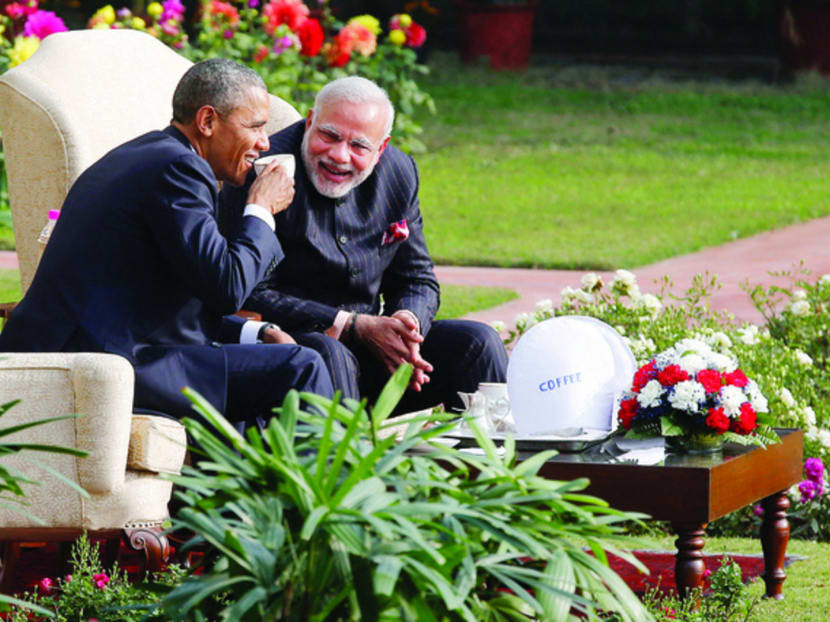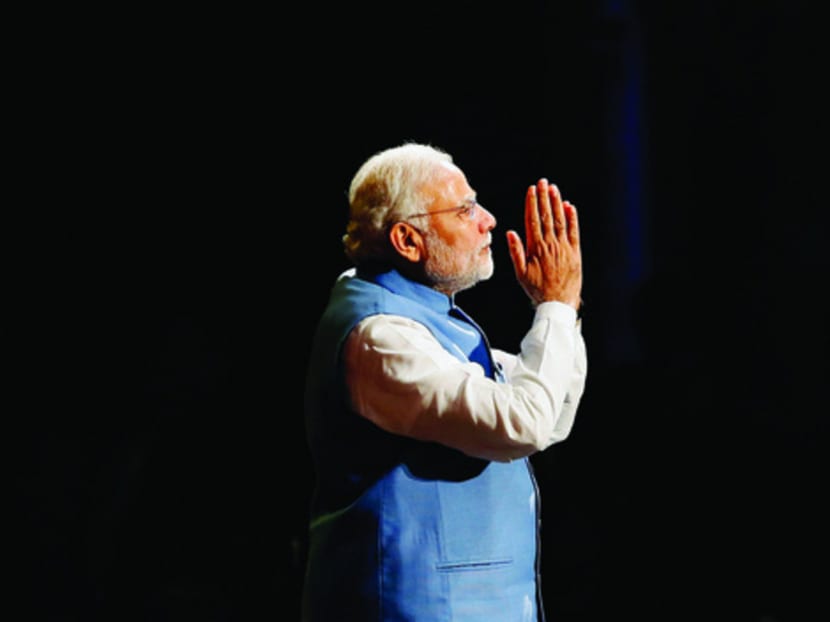Modi one year on: Good for business or business as usual?
NEW DELHI — Even his harshest critics have a grudging admiration for Mr Narendra Modi’s energetic performance as Indian Prime Minister since the landslide victory of his Bharatiya Janata Party a year ago. “He exudes power. He exudes authority, indefatigable energy,” concedes Mr Jairam Ramesh, a minister in the Congress-led coalition that was crushed in elections last May. “He’s changed the atmospherics of government.”


NEW DELHI — Even his harshest critics have a grudging admiration for Mr Narendra Modi’s energetic performance as Indian Prime Minister since the landslide victory of his Bharatiya Janata Party a year ago. “He exudes power. He exudes authority, indefatigable energy,” concedes Mr Jairam Ramesh, a minister in the Congress-led coalition that was crushed in elections last May. “He’s changed the atmospherics of government.”
Indian business leaders are in awe of Mr Modi’s almost monastic lifestyle — a punishing schedule that is said to begin at 5am — and his determined focus to transform India into a developed economy, eventually fit to match China. “Everyone’s scared of the Prime Minister,” said one admiring tycoon.
However, the end of his first year has also been marked by mutterings from both business leaders and his Hindu nationalist supporters — as well as glimmers of hope for political opponents such as Mr Rahul Gandhi, the much-mocked Congress leader-in-waiting, who floundered after his party’s calamitous defeat but appears reinvigorated following a mysterious two-month sabbatical abroad.
The critics fall into two camps. First, there are those such as Mr Gandhi who say Mr Modi is fulfilling their worst fears as an autocrat beholden to big business, careless of the poor, scornful of civil society, and inclined to persecute minority Muslims and Christians.
Analysts are divided on whether communal tensions have indeed risen since the election, but many minorities are alarmed nonetheless. “I am not an Indian anymore, at least in the eyes of the proponents of the Hindu Rashtra (nation),” wrote Mr Julio Ribeiro, a prominent Christian, following a series of attacks vandalising churches.
Second, there are the investors who accuse his government of lacking boldness on its promised economic reforms. Mr Ramesh falls firmly into the first category, condemning Mr Modi for trying to ride roughshod over Parliament by forcing through a new land law that he said would deprive Indian farmers of legal protection against compulsory purchase of their fields for factories and property developments.
“He’s taking India on the road of illiberal democracy, where the institutions of democracy exist — political parties, elections, Parliament — but the core of democracy gets extinguished,” he said. “It’s a highly centralised, one-man operation. It’s a Lee Kuan Yew, Xi Jinping operation.”
Many investors, by contrast, said they would relish a leader in the mould of the late Mr Lee, or even the present Chinese President. Their gripe is not that Mr Modi has done too much, but that he has not done enough: He should, they say, bring order to the noisy chaos of the world’s largest democracy and start to extract concrete results from the quagmire of its notorious bureaucracy.
Few deny Mr Modi presides over a much improved economy, albeit one aided by a collapse in oil prices. Inflation is tumbling. Central bank governor Raghuram Rajan has cut interest rates, with more to come. The annual growth rate has surpassed 6 per cent, from lows below 5 per cent two years ago. Confusion remains about the country’s actual growth, which was boosted by controversial statistical revisions last year, but most economists think India is still on track to overtake China to become the world’s fastest-growing large economy.
There have been other accomplishments, too. The government has enacted laws and directives to liberalise foreign investment rules in areas such as insurance and defence in what Mr Jayant Sinha, a senior minister, calls “the most productive legislative period in years”. Individual states, such as Rajasthan, have been encouraged to ease labour laws.
Under Mr Arun Jaitley, a barrister turned Finance Minister who is effectively Mr Modi’s number two, the government has also re-energised the bureaucracy, abandoned costly diesel subsidies, announced plans to boost public investment in infrastructure and devolved more spending power from the centre to India’s 29 states.
It is also trying to introduce a long-awaited general sales tax that would make the country a single market. But opposition in the Upper House of Parliament may now delay its launch beyond the promised date of April next year.
MIXED RECORD
“The biggest challenge was to restore the credibility of the Indian economy,” Mr Jaitley said. “In the past year, every decision we have taken points to one direction, we’ve been trying to reform and liberalise.”
Corruption in the upper reaches of New Delhi has also disappeared, Mr Jaitley claims: “Today, people don’t have to come for favours to ministers. The systems have all been made very transparent.” Many industrialists appear to agree, noting they now rarely have to organise awkward meetings to lobby ministers, or risk losing contracts to unscrupulous competitors.
“We used to feel we were running a one-legged race, but all of that is now gone,” said Mr Anand Mahindra, the billionaire head of the Mahindra Group, a large industrial conglomerate. Mr Modi’s government has organised transparent auctions for coal mining rights and mobile phone spectrum too, potentially ending another major source of graft.
Elsewhere, though, the record is less impressive, especially in social services such as sanitation, health and education for India’s growing population of 1.3 billion. Mr Modi has set out many audacious goals: To clean India’s squalid streets, to save the Ganges from pollution and to provide toilets for the half of his fellow citizens who have no access to one. Then there has been heady talk of transforming India into a manufacturing hub, installing 100 gigawatts of solar power capacity and building 100 “smart cities” to cope with the hundreds of millions set to move to towns and cities from India’s villages in the coming decades.
However, there is little clarity on the policies necessary for delivering these — and a shortage of skilled technocrats among the BJP’s ministers. “In lots of areas, it is all vision and little substance,” said Mr Saurabh Mukherjea, head of equities at financial group Ambit Capital in Mumbai. Or, as Mr Arun Shourie, a respected former BJP minister, put it in a recent television interview: “The situation is like the many pieces of a jigsaw puzzle lying in a mess, with no big picture in mind about how to put them together.”
A particular problem is the inability of private-sector groups, heavily indebted to banks already themselves burdened with bad loans, to rekindle investment in the large-scale infrastructure and energy projects that could underpin future growth.
Mr Jaitley said he will invest “huge amounts in the railways and infrastructure” to compensate, having announced roughly US$11 billion (S$15 billion) of new public investment in his recent Budget. But India also needs to raise about US$200 billion by 2020 to recapitalise its financial system, analysts estimate, while Mr Modi has moved only gradually to reform state-controlled lenders and baulked entirely at moving some of them into private ownership. There is also a programme to help finance the budget deficit by selling small stakes in the lumbering public sector giants that dominate areas such as energy and mining, but no plans to improve their management or privatise them entirely.
Part of Mr Modi’s problems are bureaucratic. Although he has terrified New Delhi’s civil servants into reporting on time and keeping their offices tidy, many of those with secure jobs for life remain reluctant to take decisions that could be questioned under a future government. Files are frequently passed up to the overburdened Prime Minister’s Office for a final decision, creating logjams. Firms complain that doing business is almost as hard as ever. “There is still far too much bureaucracy,” said Mr Marten Pieters, the outgoing Indian head of telecoms group Vodafone. “So much time is wasted on, in my view, totally useless things.”
On some occasions, ironically, bureaucrats have also angered investors by becoming hyperactive. A damaging tax row with global fund managers seems to have erupted because India’s Finance Ministry failed to notice that its tax officials planned to raise more than US$6 billion in tax from international investors who had hitherto been exempted.
INTERNATIONAL SUCCESS
On the vital issue of the economy, then, Mr Modi has been awarded only a mixed report card by the corporate chiefs who had hoped to participate in a surge of public and private investment, and to see the government sweep away obstacles to doing business in India.
But on foreign policy, a topic barely mentioned in last year’s election campaign, Mr Modi has unexpectedly triumphed. He started on his first day by inviting the leaders of neighbouring countries to his inauguration and has since overseen a long-delayed realignment of the India-Bangladesh border, substantial emergency aid to earthquake-hit Nepal and support for a new Sri Lankan coalition that replaced the pro-China Rajapaksa regime.
In contrast to his exhausted-looking predecessor Manmohan Singh, Mr Modi has also vigorously courted global and Pacific powers from the United States to Japan, and from China to Australia and Germany. “It’s a question of speed and scale,” said one Indian diplomat, recounting Mr Modi’s numerous overseas visits. “That’s the big change. Mr Modi really wants to put India on the world map.”
At home, he remains a powerful orator, and one who has shown an ability to correct some mistakes. Amid unease about his silence on minority rights, he reassured a Christian gathering that all Indians could adopt whatever religion they chose and said his government “will not allow any religious group, belonging to majority or minority, to incite hatred against others overtly or covertly”.
And after he was mocked during Mr Barack Obama’s visit to New Delhi as a megalomaniac for wearing an expensive pinstripe suit embroidered with his name repeated over and over along the stripes, he hastily had the item auctioned for charity.
But Mr Modi is no longer politically unassailable. In the Delhi state election in February, the BJP suffered a crushing defeat, winning only three of the 70 seats compared with the 67 won by the Aam Aadmi Party of anti-corruption activist Arvind Kejriwal.
While economic growth should continue to accelerate, even many of his supporters and advisers said “big bang” reforms were never on the cards. It is time, they said, to accept that the euphoric expectations of Mr Modi harboured by investors and ordinary Indians alike were always unrealistic.
Mr Mahindra said the government’s initial achievements only serve to focus attention on the much longer list that remains. He predicts Indians will now “roll up our sleeves” and work out how to overcome these many obstacles. “Mr Modi hasn’t lost his optimism or his energy,” he said. But he adds: “People are realising now, India is a very hard country to change or to transform.” THE FINANCIAL TIMES





